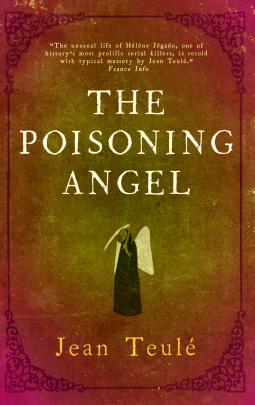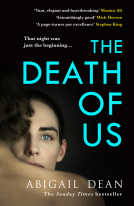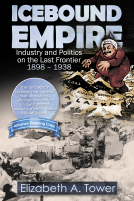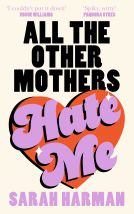
The Poisoning Angel
by Jean Teule
This title was previously available on NetGalley and is now archived.
Send NetGalley books directly to your Kindle or Kindle app
1
To read on a Kindle or Kindle app, please add kindle@netgalley.com as an approved email address to receive files in your Amazon account. Click here for step-by-step instructions.
2
Also find your Kindle email address within your Amazon account, and enter it here.
Pub Date 14 Jul 2014 | Archive Date 10 Nov 2015
Description
"Unique. Hilariously funny, gruesome, macabre, and graphic, it is a worthy witness to great French modern literature."—Words and Peace
Another real-life character tour de force from Jean Teulé featuring a famous female serial killer from the nineteenth century.
Little Hélène Jégado had always been different. Schooled in the ancient beliefs of the Breton people by her mother, the beautiful child grows up feeling detached from the nineteenth-century world around her and yet destined for a terrible vocation. Beginning with the demise of her mother . . .
A Note From the Publisher
$15.95 USD
Advance Praise
Available Editions
| EDITION | Paperback |
| ISBN | 9781908313683 |
| PRICE | £8.99 (GBP) |
Average rating from 23 members
Featured Reviews
 Sarah R, Educator
Sarah R, Educator
A fictionalized account of the life of Basque serial killer Hélène Jégado, written by the French novelist Jean Teulé, "The Poisoning Angel" weaves facts, superstition and wholly imagined scenes into a lively and engaging book. Teulé has a gift for vivid, cinematic description, and the book is full of images that manage to be simultaneously chilling, disgusting, and hilarious. Those who've enjoyed Shirley Jackson's "We Have Always Lived in the Castle" may find themselves easily drawn into the world of Hélène "Thunderflower" Jégado, who leaves a trail of bodies wherever she goes, and manages to get away with murder for a really long time. Entertaining and unusual.
 Annie S, Librarian
Annie S, Librarian
Most of the histories of serial killers I’ve seen began with Jack the Ripper. A few go back further to talk about Gilles de Rais and Elizabeth Báthory. As the histories of serial murder go back in time, the explanations for the killers seem to move from rational psychology to more primitive discussions of evil, perhaps because the historical record is so scanty no other explanation is possible. Hélène Jégado is a new name to me. And, as Jean Teulé presents her story in The Poisoning Angel, the reason for her three dozen murders hovers somewhere in between psychological understanding and human evil. We know a bit more about her than we do about the earliest serial killers, but we don’t know enough to know why she poisoned so many people with so little motivation.
Hélène Jégado was born in a remote Brittany village sometime in 1803. Jean Teulé tells us that she was steeped in Celtic myth and legend as she grew up. In fact, her first language wasn’t French; she spoke Breton until she went looking for work after she (allegedly) poisoned her mother and her father sold the family farm. Hélène never married. She lived an itinerant life, working as a cook in any house that would hire her. Every where she went—as far as we know—she would sprinkle arsenic powder in her employers’ food. The first murders attributed to Hélène occurred in 1833 and she carried on killing people until she was arrested in 1851 (with an unexplained 10 year gap in the 1840s). After a brief trial, Hélène was executed by guillotine.
The reason Teulé gives for Hélène capricious killings is that she may have believed she was the Ankou, the Breton personification of Death, or that she was working for the Ankou. Throughout The Poisoning Angel, Hélène mentions her mission: to dispatch as many people as possible on the Ankou’s behalf. At the very end of the book, this explanation is further elucidated as Hélène’s way of dealing with the fear and uncertainty in life by giving herself control over her victims’ lives.
As Teulé presents it, Brittany is still stubbornly Celtic. Many of the Catholic saints in the churches around the province are openly worshipped according to Celtic beliefs. Old rituals and superstitions and stories govern how people live, to the disgust of their “French” neighbors. Two Norman wigmakers follow Hélène throughout her life, loosing their modern French ways over the years to become more savage and primitive. Their descent is a sinister metaphor for the way Breton ideas of death and the supernatural refuse to loose their grip on the people in the extreme northwest of France.
Eat Him if You Like, the first book I read by Teulé, was told in a deceptively simple manner. It was like reading someone’s bad dream, made worst by knowing it was based on a real event. The Poisoning Angel has a few more details in it to help us understand the strangeness of Brittany in the first half of the nineteenth century. Yet it still retains that odd, almost folkloric, simplicity of style. I wonder if I knew more about Breton myths I would pick up on the story that The Poisoning Angel is mapped against, if any. I felt like I was missing some deeper significance because the language of the book is so lacking in a sense of reality. This isn’t a complaint. What I mean to say is that The Poisoning Angel has the same sense of timelessness that folklore does. The book has a strong sense of place, but its plot seems to come from the deep past while still carrying a strong sense of warning about the darker side of humanity, the parts we still don’t understand after 100 years of modern psychology.
Gallic Press has been re-releasing Jean Teulé’s books via NetGalley for review and, I have to say, I’m hooked on his retellings of forgotten French crimes.
I received a free copy of this ebook from NetGalley, in exchange for an honest review.
 Kel M, Media/Journalist
Kel M, Media/Journalist
In translation
Eat Him If You Like: A Novel by Jean Teulé, translated by Emily Phillips (Gallic Books, $12.95).
The Poisoning Angel by Jean Teulé, translated by Melanie Florence (Gallic Books, $15.95).
The Suicide Shop by Jean Teulé, translated by Sue Dyson (Gallic Books, $13.95).
What these novels by Jean Teulé have in common is a gift for making the absurd so understandable that we’ll question why we call it absurd–and all the while, taking a gleeful delight in the details, no matter how grotesque.
The first of these, Eat Him If You Like, is a re-telling of an actual historic event: the murder by mob of Alain de Monéys in the northern French village of Hautefaye in 1870.
Teulé begins with a description of a perfectly ordinary young gentleman having a perfectly normal summer day, one of his last before he goes to fight in Napoleon III’s ill-fated war with the Prussians. Things quickly go awry, though, and, in tone, at least, the narrative tumbles down into the most grotesque of frenzied violence.
The war is going very badly; on top of this catastrophe, there’s a natural disaster unfolding in the sort of slow apocalypse that droughts naturally take. The stressors on the population are intense, and Teulé makes that clear without in any way excusing the carnage to follow.
Reading this novel at a moment in time when economic pressures are pushing Americans to the point of considering some of Donald Trump’s proposals, it quickly makes clear how badly things can get out of control when a stressed population is given a focal point for their fears and a mob to grant some semblance of anonymity. Eat Him If You Like is fascinating in the way that the political campaign is fascinating: It’s absurd, but dangerous.
In The Poisoning Angel, Teulé moves to another moment in time and another terrifying grotesquerie. In this case, it’s a fictional re-telling of the life of Hélène Jégado, a 19th century French serial poisoner. This is intriguing both because the story is so unknown in the Anglosphere, where London’s Jack the Ripper is usually give the title of the first serial killer, and also because Jégado was female.
In this novel, Teulé starts with the Celtic culture of the Bretons, where the young Hélène is taught herb-lore by her mother, who also instills a fear of the Ankou, a demon-like assistant to Death itself.
There’s also an element of the carnivalesque here, as a pair of French wig-makers become her avid followers, snip-snip-snipping bits of hair as she kills her way through France.
Finally, The Suicide Shop, a novel set in a dystopian, climate-changed future, where suicidal despair is not only understandable, it’s the norm. The shop-keeping Tuvache family (all bearing the names of famous suicides) provide the means to make an end of it. The problem arises when the youngest Tuvache son, a boy who is born to laugh and be happy–and who insists upon spreading that joy around.
Definitely a dark comedy, The Suicide Shop has a twist ending that leads in a more philosophical direction. It’s also been made into an animated film, now on my list.
In tone, these are all sly, dry and funny books–with the humor coming in disturbing ways–and operate in that place where fables and speculations meet up with literary writing. Teulé is highly recommended for those who are not among the faint of heart.
Readers who liked this book also liked:
Sarah Harman
General Fiction (Adult), Mystery & Thrillers, Women's Fiction








